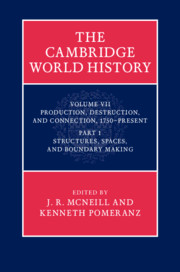Book contents
- The Cambridge World HistoryVolume VII
- The Cambridge World History
- Production, Destruction, and Connection, 1750–Present
- Copyright page
- Contents
- Figures
- Maps
- Tables
- Contributors
- Preface
- 1 Production, destruction, and connection, 1750–present: introduction
- Part I Material matrices
- Part II Population and disease
- Part III Politics
- 11 The evolution of international law
- 12 On nationalism
- 13 Assessing imperialism
- 14 Self-strengthening and other political responses to the expansion of European economic and political power
- 15 Decolonization and its legacy
- 16 Genocide
- 17 Communism and fascism
- Part IV World regions
- Index
- References
13 - Assessing imperialism
from Part III - Politics
Published online by Cambridge University Press: 05 May 2015
- The Cambridge World HistoryVolume VII
- The Cambridge World History
- Production, Destruction, and Connection, 1750–Present
- Copyright page
- Contents
- Figures
- Maps
- Tables
- Contributors
- Preface
- 1 Production, destruction, and connection, 1750–present: introduction
- Part I Material matrices
- Part II Population and disease
- Part III Politics
- 11 The evolution of international law
- 12 On nationalism
- 13 Assessing imperialism
- 14 Self-strengthening and other political responses to the expansion of European economic and political power
- 15 Decolonization and its legacy
- 16 Genocide
- 17 Communism and fascism
- Part IV World regions
- Index
- References
Summary
Keywords
- Type
- Chapter
- Information
- The Cambridge World History , pp. 331 - 365Publisher: Cambridge University PressPrint publication year: 2015



